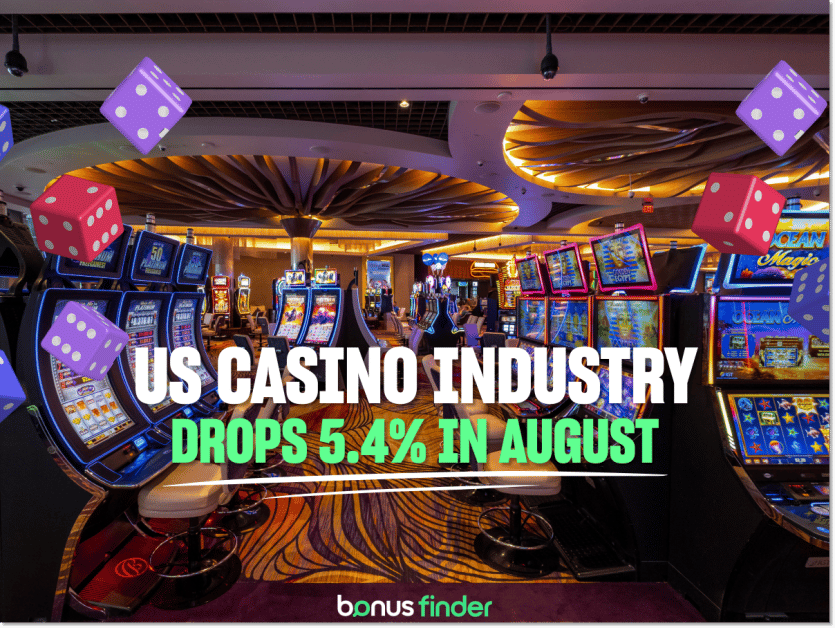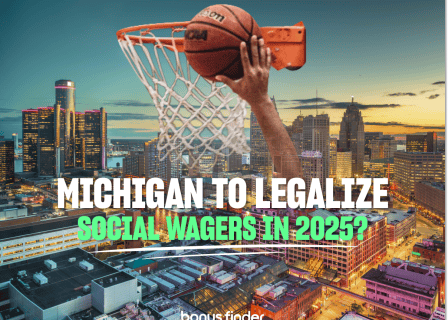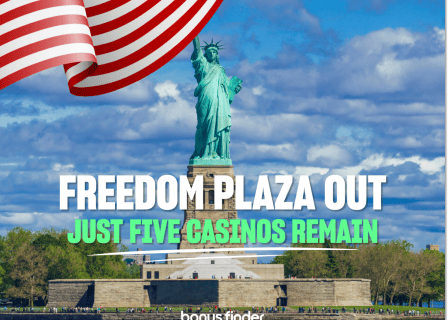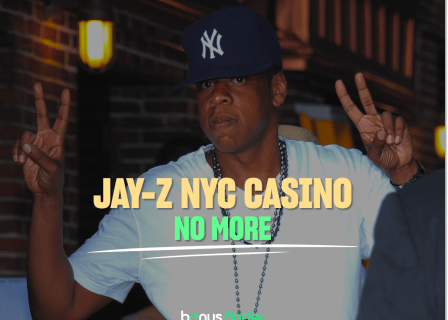US casino attendance in freefall as foot traffic drops 5.4% in August
Casino visitation in the United States continued a year-on-year slump in August 2025, as attendance dropped 5.4% compared to the same period last year. This has been a notable pattern since the rise in popularity of US online casinos.
News comes by way of an investor note by industry analyst David Katz, of Jefferies Equity Research.
In his report, Katz outlined that retail gambling venues are yet to achieve pre-pandemic turnout; this year’s findings showcase a 17.5% decrease from figures in August 2019.
Despite declining attendance, gross gambling revenue (GGR) remains steady, indicating reliable spending from specific player groups.
August casino visitation up after “outlier” month of July
According to Katz, July’s notable regression should be deemed an anomaly – with a nationwide 10% setback being “more outlier than trend.” He is of the mind that August’s mild return to form should be viewed as a sign of things to come.
And, given resilient GGR figures, Katz suggests that holistic industry data should trend upward throughout the rest of the year. Such impressive isolated player expenditure also leaves room for ongoing revenue expansion as attendance figures rise, explains the report.
Post-pandemic casino industry driven by “quality”, not “volume”
“Revenue is being driven less by sheer visitor volume and more by the quality of spending,” says Katz.
Simply put, the field is heavily reliant on consistent individual spending power over mass wagering.
In a note detailing his US retail gambling report, Katz discussed that the domestic market exhibits signs of stabilization. Although retail attendance figures have remained steadily below those taken before the 2020 shutdown, players now spend more per visit.
Moreover, consumers are engaging in new facilities and products – with venues like the historical Golden Gate Hotel & Casino replacing their entire first floor with AI ETGs.
State-by-state data erratic as new products enter the fold
Certain states are enjoying greater growth than traditionally successful regions. For example, Las Vegas’ current downturn is not mirrored by Pennsylvania, where visitation is up on pre-pandemic levels by over 18%.
On the other side of the coin, land-based gambling trickled downward by 1.6% in Massachusetts compared to August 2024. When weighed against numbers for 2019, the Bay State’s plunge stands at an eye-watering 21.9%.
Katz attributes this stark plummet not to dwindling products but rather New Hampshire’s fledgling competing casino scene.
Illinois and Atlantic City took noteworthy hits during August, too. Meanwhile, Colorado welcomed a 5% increase in foot traffic – partially credited to the success of Monarch Casino Resorts’ since its 2022 inception.
Particular bright spots came in the form of Penn Entertainment and Churchill Downs. Both organizations recently unveiled brand-new venues across multiple states; Katz expects Churchill Downs’ The Rose, in Virginia, and Penn’s new-look Hollywood Joliet to attract visitors.
Most damning is Katz’s Las Vegas analysis, as the Jefferies Managing Director says his team “continue to believe regional gaming is better positioned for growth in the near term compared to Las Vegas.”
Further, Katz explained that analysts should not expect a Nevada uptick for several months, as “Expectations for the Strip are confirmed to be low until the group slate accelerates in the final trimester of 2025.”
Las Vegas slump: Operators unconcerned by downturn
On that point, August represented a continuation of Las Vegas’ disappointing summer – as ‘Sin City’ saw its deepest drop in retail visitors for four years.
Yet, two of the region’s most prominent operators, Caesars Entertainment and MGM Resorts, remain confident that this summer’s figures are merely a temporary blip in an otherwise healthy environment.
MGM CEO and President, Bill Hornbuckle, doubled down on the operator’s positive outlook, dubbing Las Vegas “as solid as ever” in the wake of a disappointing summer.
However, Hornbuckle and co. must contend with revamped tax laws targeting consumers from 2026. A motion included within President Trump’s ‘One Big Beautiful Bill Act’ only allows players to deduct 90% of gambling losses from taxes – potentially benefiting offshore online casinos that avoid domestic regulations.
And that tax-focused bill precedes an already tumultuous period for US tourism. According to research accrued by the Las Vegas Convention and Visitors Authority, international, city and hotel bookings were down during summer 2025. A significant reduction in Canadian and Mexican guests was noted across the board.
Last month, state Mayor Shelley Berkley commented on dwindling international incomings: “We have a number of very high rollers that come in from Mexico that aren’t so keen on coming in right now. And that seems to be the prevailing attitude internationally.”
Nevertheless, Katz’s current bearish stance will soon be replaced by a bullish outlook for Las Vegas – but a major question mark as to whether tangible gains will be derived from proposed improvements in the final trimester of the year remains.
National sentiment towards gambling remains positive despite lacking attendance
Looking beyond Las Vegas, an American Gaming Association (AGA) survey found that 65% of Americans believe that the gaming industry acts responsibly when it comes to gambling practices.
Crucially, 81% of retail casino visitors agreed that operators are determined to battle problem gambling. When evaluating sports-focused players, that figure rises to 88%.
Tantamount to Katz’s industry-wide study is this: of the 55% of adults who participated in some form of gambling during 2025, 28% did so in a physical venue.
Theoretically, that means 72% of players are not engaging in retail wagering.
Will online gambling end retail sustainability?
In a separate post, the AGA voiced concerns that the unregulated online gambling market could quicken the decline of an already-struggling retail industry.
Bill Miller, AGA CEO and President, said: “Illegal gambling operators are thriving at the expense of American consumers, siphoning billions in tax revenue from state governments, and undercutting the efforts of the legal market.”
Miller went on to call for the unmitigated targeting of offshore platforms: “It’s time for a national crackdown on the pervasive illegal market that is draining state coffers and putting people at risk.”
While licensed operators can maintain dual online and retail products by encouraging consumers to engage with both facilities, tackling illegal online casinos represents a steep task.
With US regulators eager to apply further tax pressure on players, weakening international tourism, from previously vital partners, and casinos relying on consistent – often local – visitors, it is plain that something must give over the next several months if the physical scene is to avoid diminishing further.









